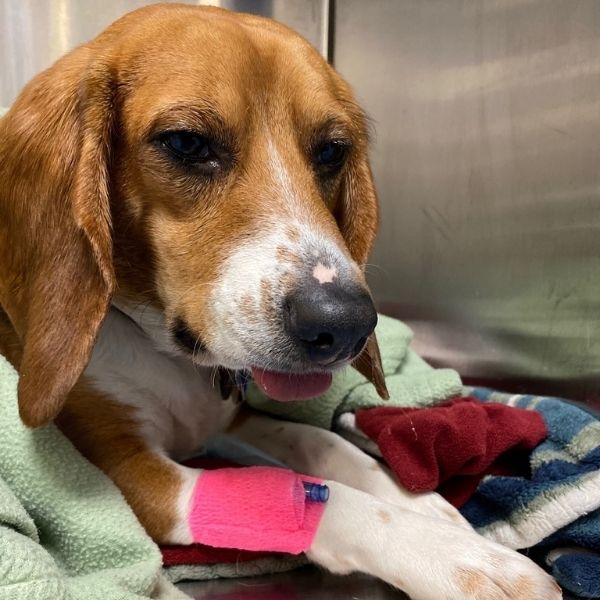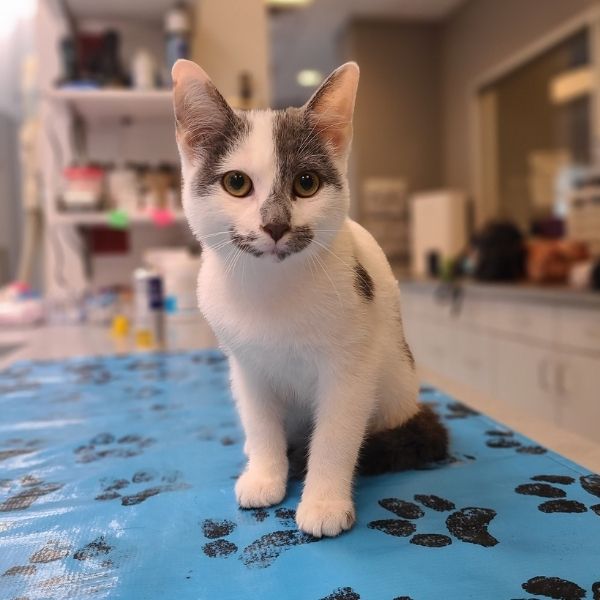Pet Surgery
We are able to do a wide range of surgical procedures from a spay, neuter, mass removals, dental procedures, select orthopedic procedures, and emergency surgical procedures.
Pet Surgery
Hospital Protocols for General Anesthesia
We understand and appreciate the concerns of owners when a pet must undergo general anesthesia. Therefore, our comprehensive patient monitoring of anesthetized patients consists of evaluating heart rate, blood pressure, EKG, blood-oxygen saturation, respiratory rate, and carbon dioxide levels. We even measure the pressure of the inflatable cuff on the endotracheal tube (breathing tube) which accompanies every anesthetized patient. We have the experience, knowledge, and equipment necessary to create the safest environment possible for our anesthetized patients. All patients are maintained on fluids to properly regulate organ function and help maintain appropriate blood pressure. Post-surgically, if the use is warranted, patients are given a laser therapy treatment to promote healing, decrease pain, and reduce inflammation.

Surgical Procedures
We are able to do a wide range of surgical procedures from a spay, neuter, mass removals, dental procedures, select orthopedic procedures, etc. There are also emergency surgical procedures that we have the capabilities of performing on a daily basis.
Post surgery, we have several areas for pets to recover in. We have a separate dog and cat room so that patients can peacefully recover. We also have a large treatment and ICU room for those patients that need a little more TLC. All our patients are monitored 24/7 by a licensed veterinary technician and we have state-of-the-art monitoring equipment to accompany them.

Spay & Neuter – Puppies
It is recommended that you spay and neuter your puppy at 5 months of age. This will be prior to any heat cycles.
Why should I neuter my puppy?
Male dogs can develop health problems in the future, such as testicular and prostate cancers if they remain intact. They can also be at risk for hormone-related diseases such as perianal adenoma. Neutering will help remove any sexual urges. Male dogs are able to detect a female in heat at great distances. Removing the source of testosterone will help decrease roaming behaviors. Male dogs can be more “headstrong” and more willing to wander away. This leaves them at risk for injury. Testosterone in intact males also drives aggression and dominant behaviors with people and other animals. Intact male dogs are also prone to urine “marking” behavior. This can be a result of an overwhelming amount of scents (from other pets or an intact female) or they are trying to claim their space.
Why should I spay my puppy?
Several health benefits are associated with spaying your puppy. First, spaying eliminates the risk of ovarian and uterine cancers. Mammary tumors are more common in female dogs that are either not spayed or were spayed after 2 years of age. The risk of a dog developing a mammary tumor is 0.5% if spayed before their first heat (approximately 6 months of age), 8% after their first heat, and 26% after their second heat.
One of the most beneficial reasons to have your puppy spayed is to prevent unexpected pregnancies. When in “heat”, the female experiences an urge to escape in order to find a mate. This unwanted and dangerous behavior is eliminated. You can eliminate heat cycles and the hormone fluctuations that cause false pregnancy following the “heat cycle.” Spaying also prevents uterine infections known as pyometra. This can be a serious and sometimes life-threatening infection.

Spay & Neuter – Kittens
It is recommended that you spay and neuter your kitten at 5 months of age. This will be prior to any heat cycles.
Why should I neuter my kitten?
Once a male cat reaches puberty, he will develop a number of behavioral changes that will make him a less desirable pet. He will become territorial and start to mark areas, even inside the house, by spraying urine. This urine has a particularly offensive odor that is difficult to remove. As the tomcat reaches sexual maturity, he will start to enlarge his territory, wanting to stray from the house. Being out of the house, there are many things he can encounter such as other animals, which he can fight or reproduce with. He can also hurt himself outside chasing female cats. The consequences of being fathering unwanted kittens or a severe physical injury.
Why should I spay my kitten?
Several health benefits are associated with spaying your cat. First, spaying eliminates the risk of ovarian and uterine cancers. Second, breast cancer is the number one type of cancer diagnosed in intact or un-spayed female cats. If your cat is spayed before her first heat cycle, there is less than ½ of 1% (0.5%) chance of developing breast cancer. With every subsequent heat cycle, the risk of developing breast cancer increases. After about 2½ years of age, Ovariohysterectomy offers no protective benefit against developing breast cancer. It is still recommended to spay no matter the age, you can still help them eliminate some chance of them developing mammary tumors.
One of the most beneficial reasons to have your cat spayed is to prevent unexpected pregnancies. When in “heat,” the female experiences an urge to escape in order to find a mate. This unwanted and dangerous behavior is eliminated. You can eliminate heat cycles and the hormone fluctuations that cause false pregnancy following the “heat cycle”. Spaying also prevents uterine infections known as Pyometra. This can be a serious and sometimes life-threatening infection.
